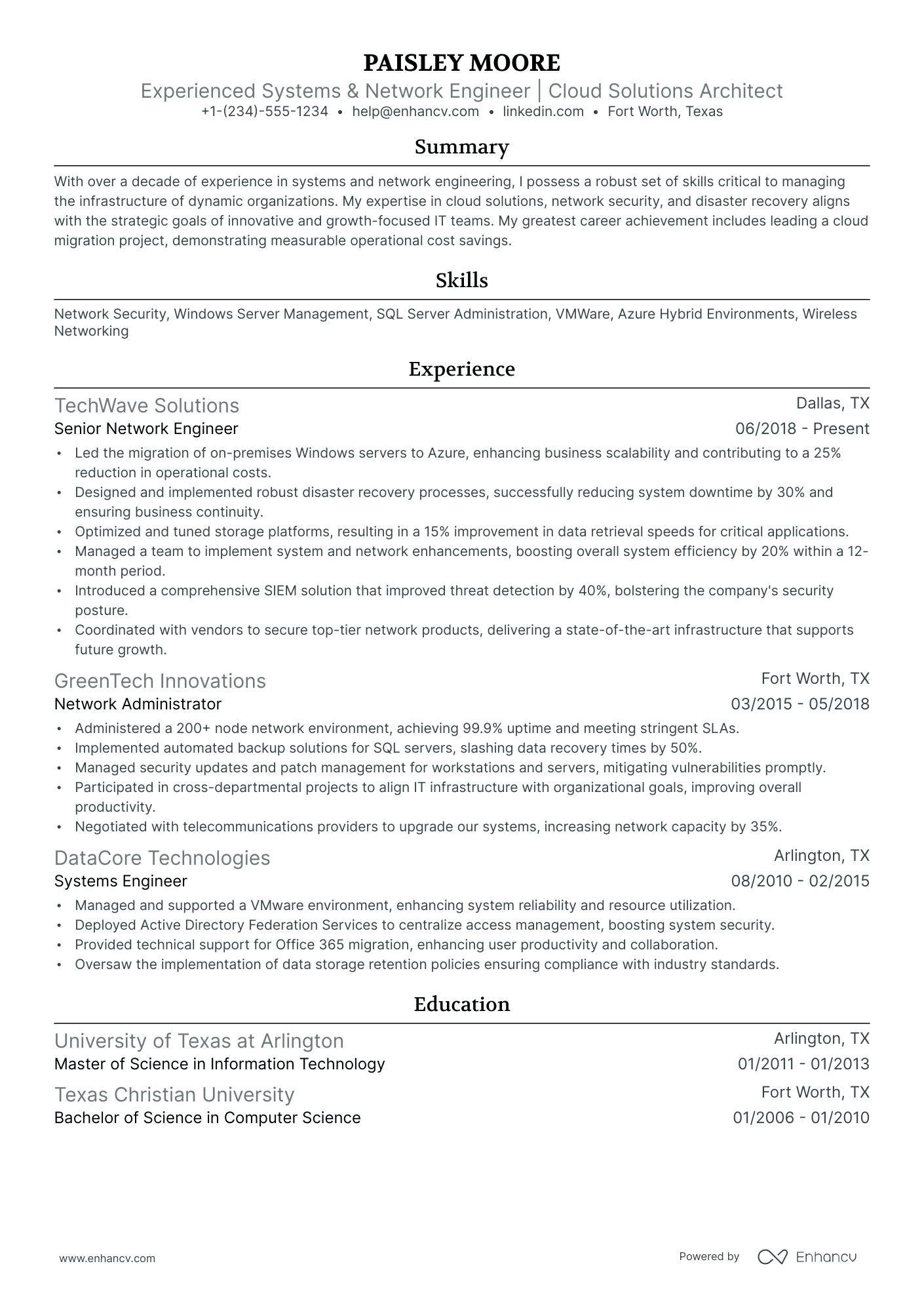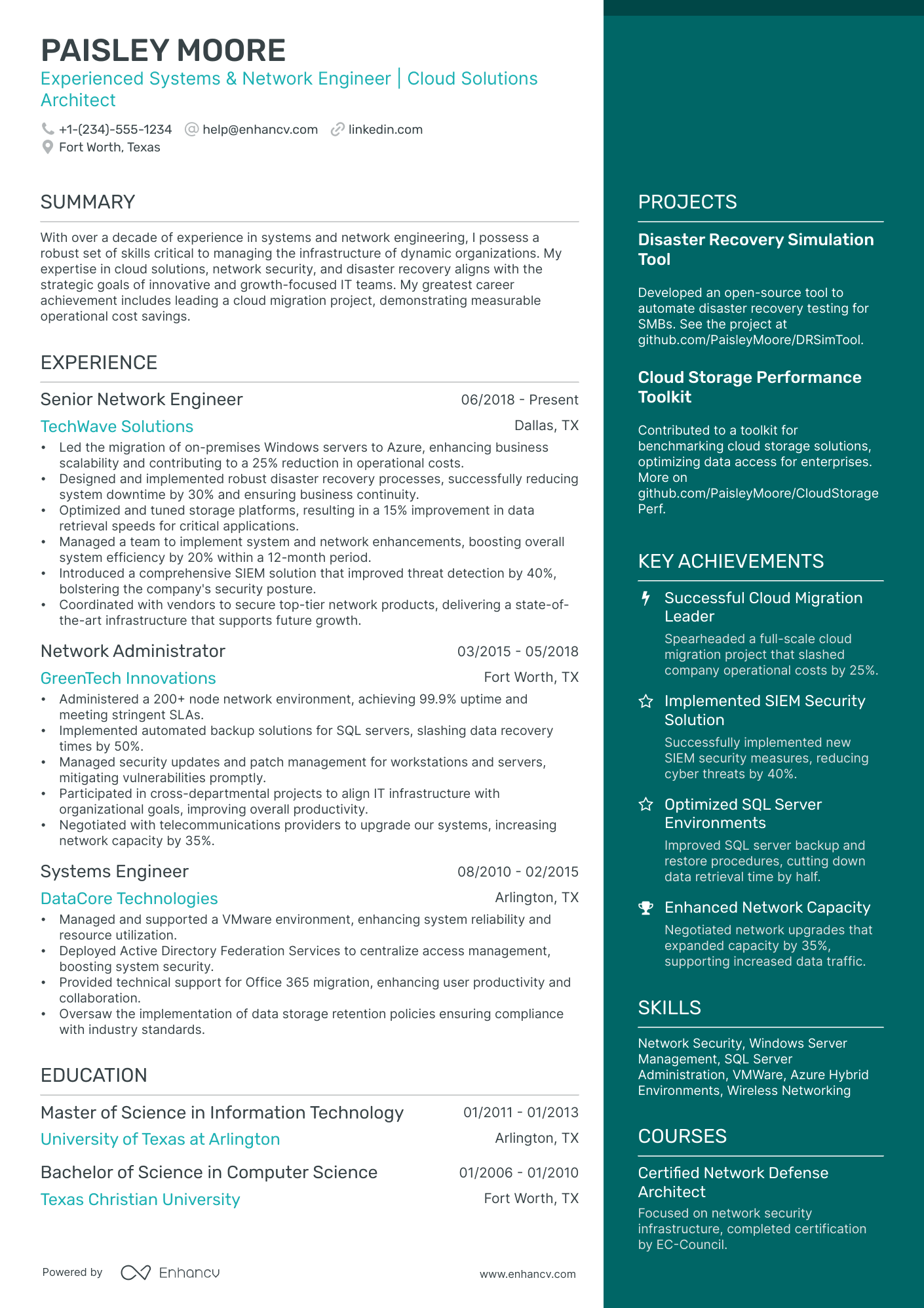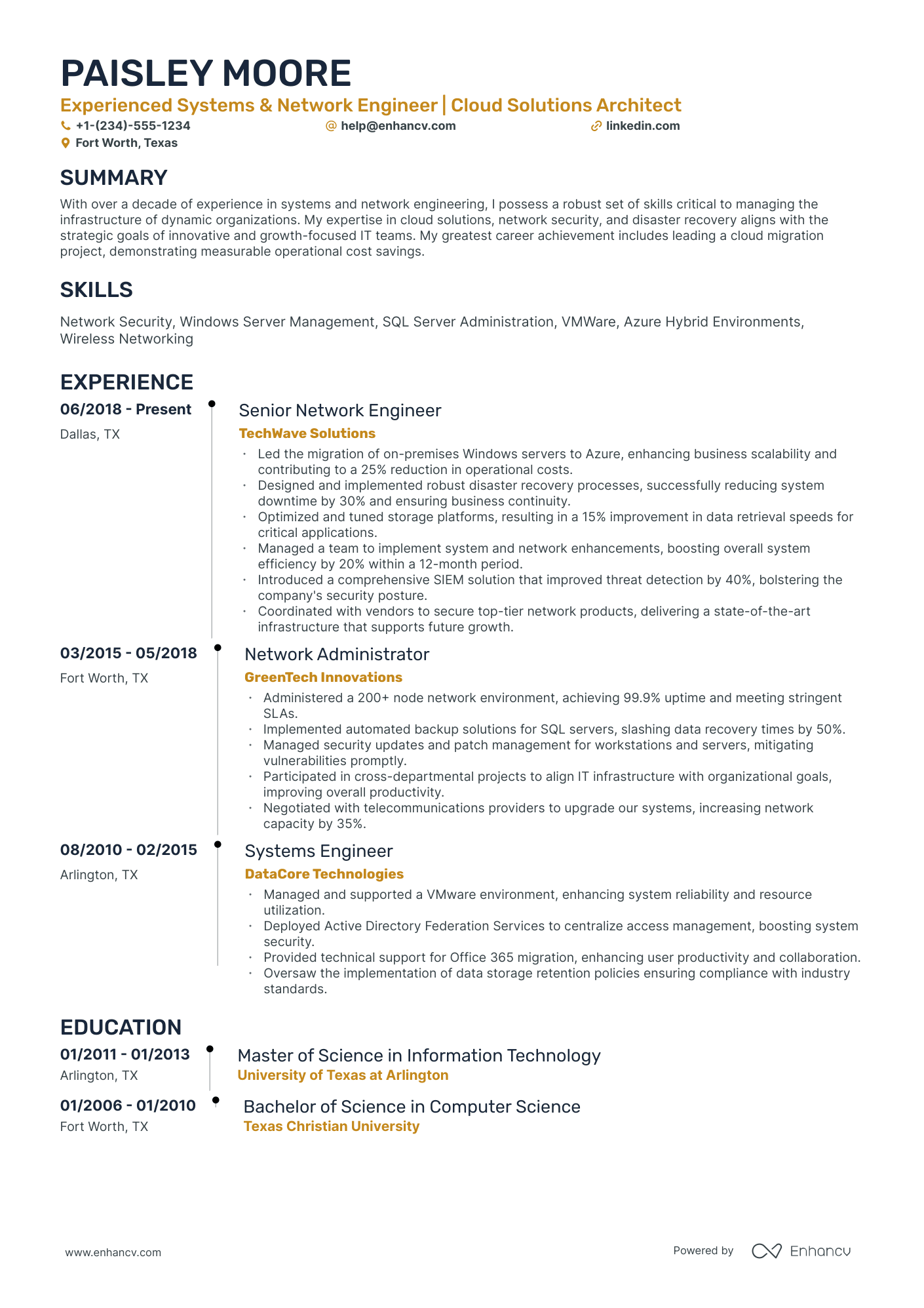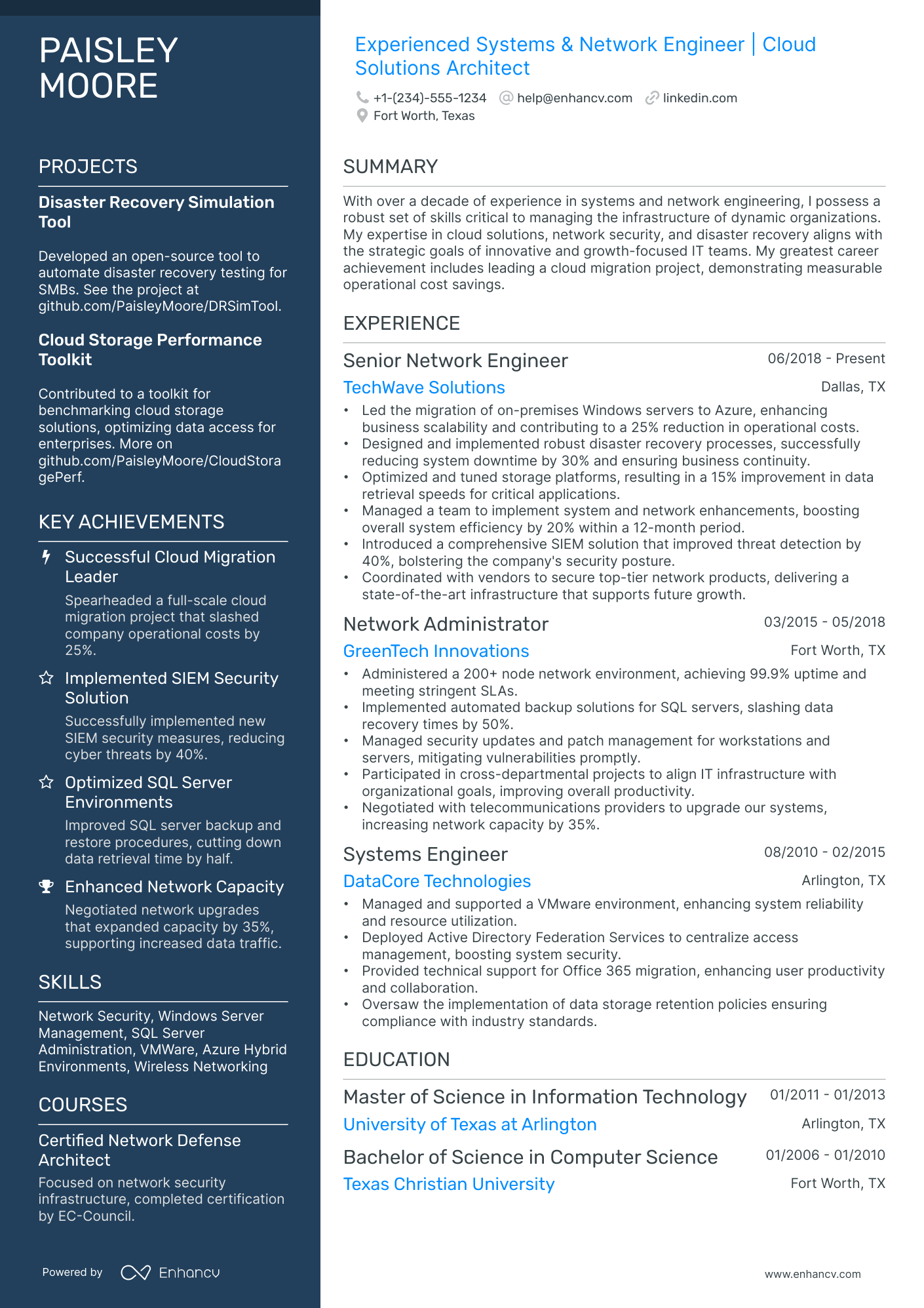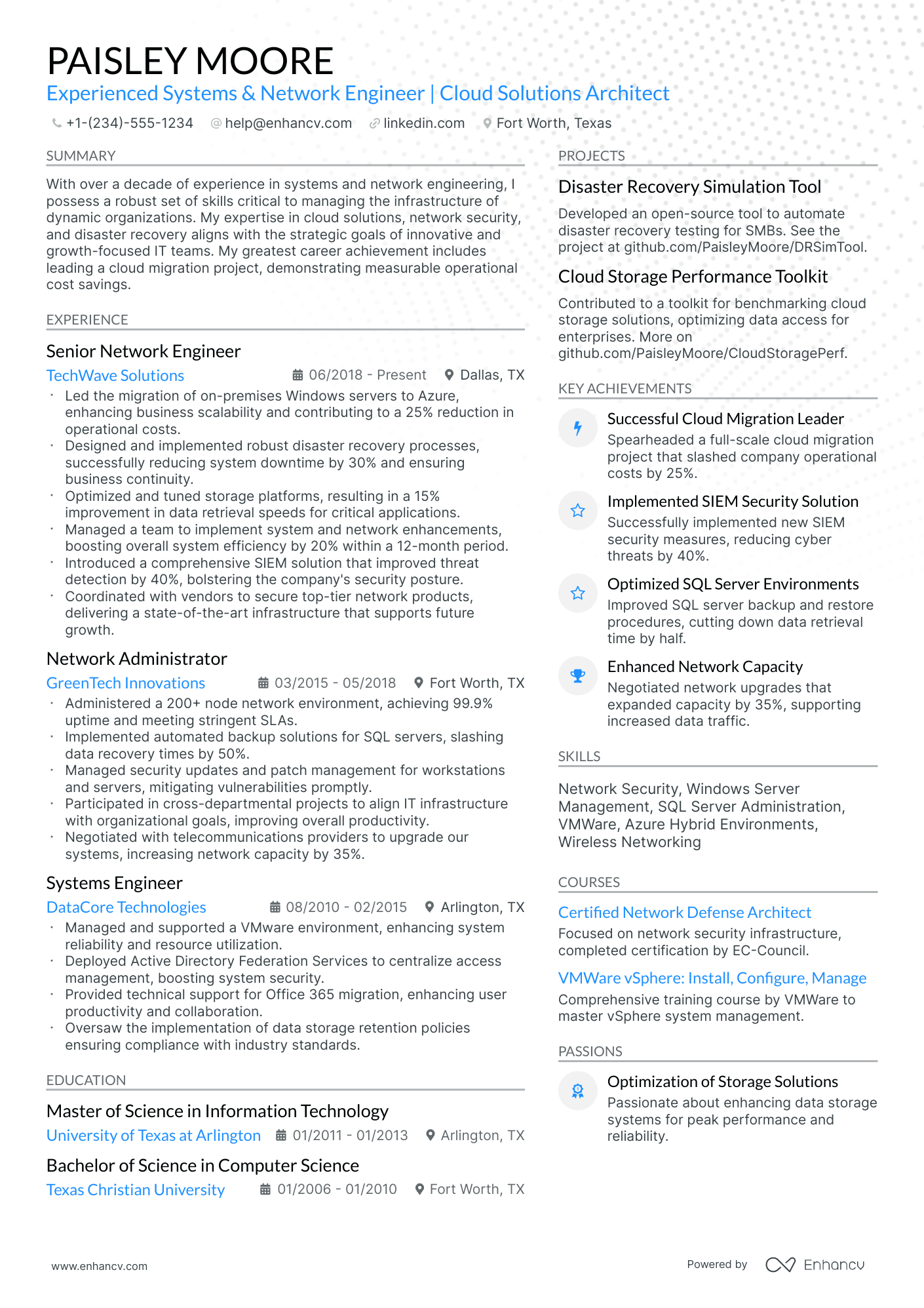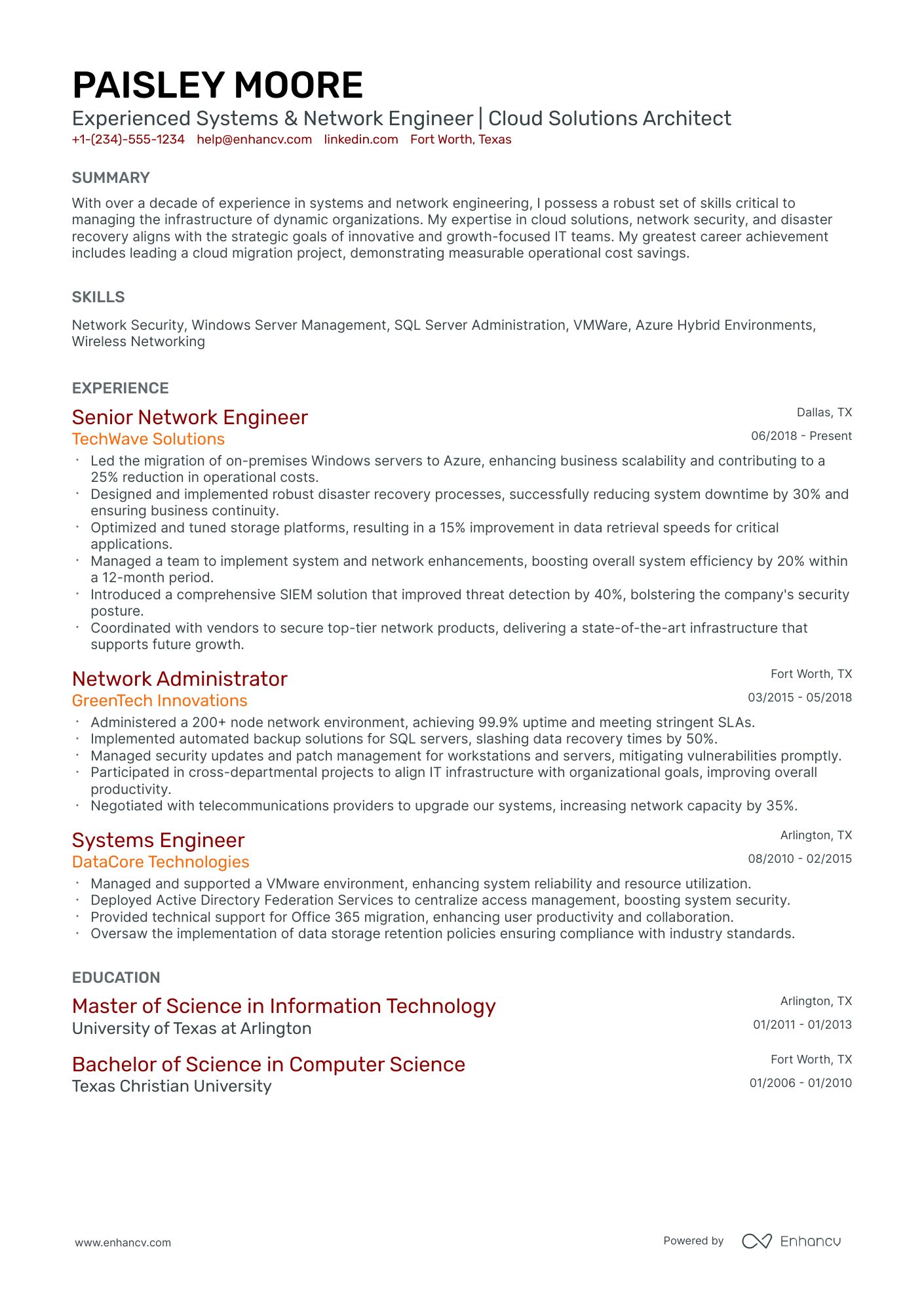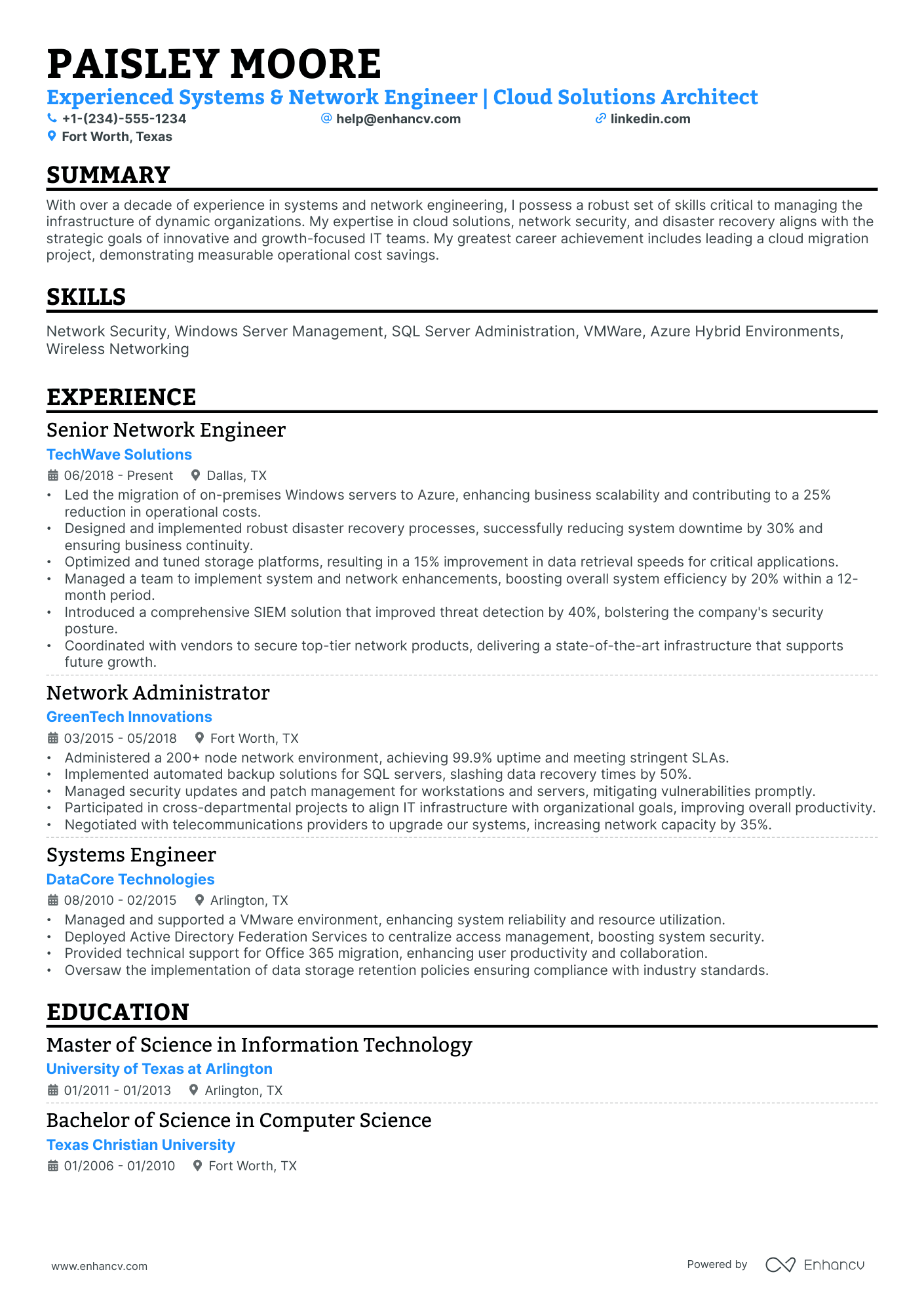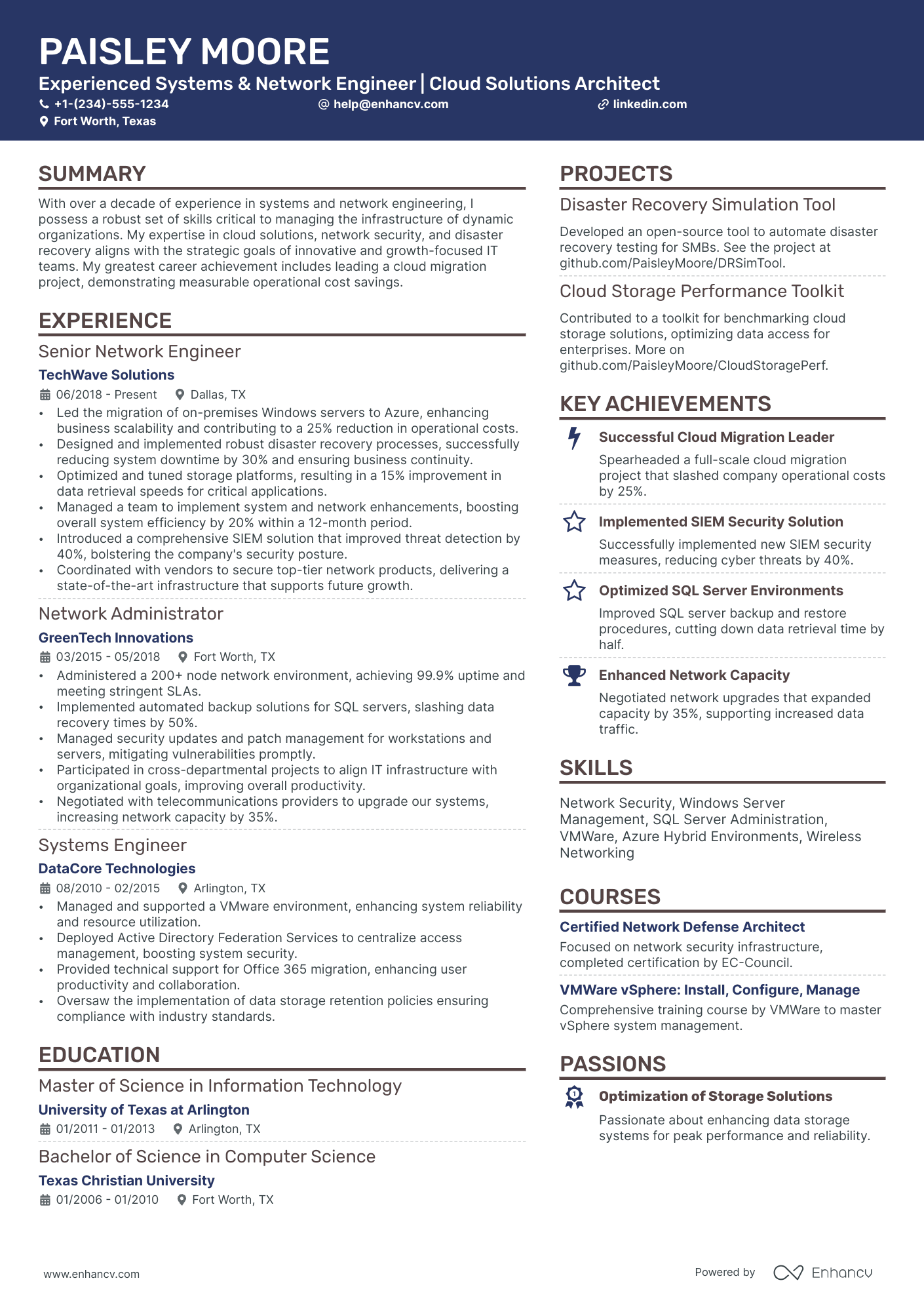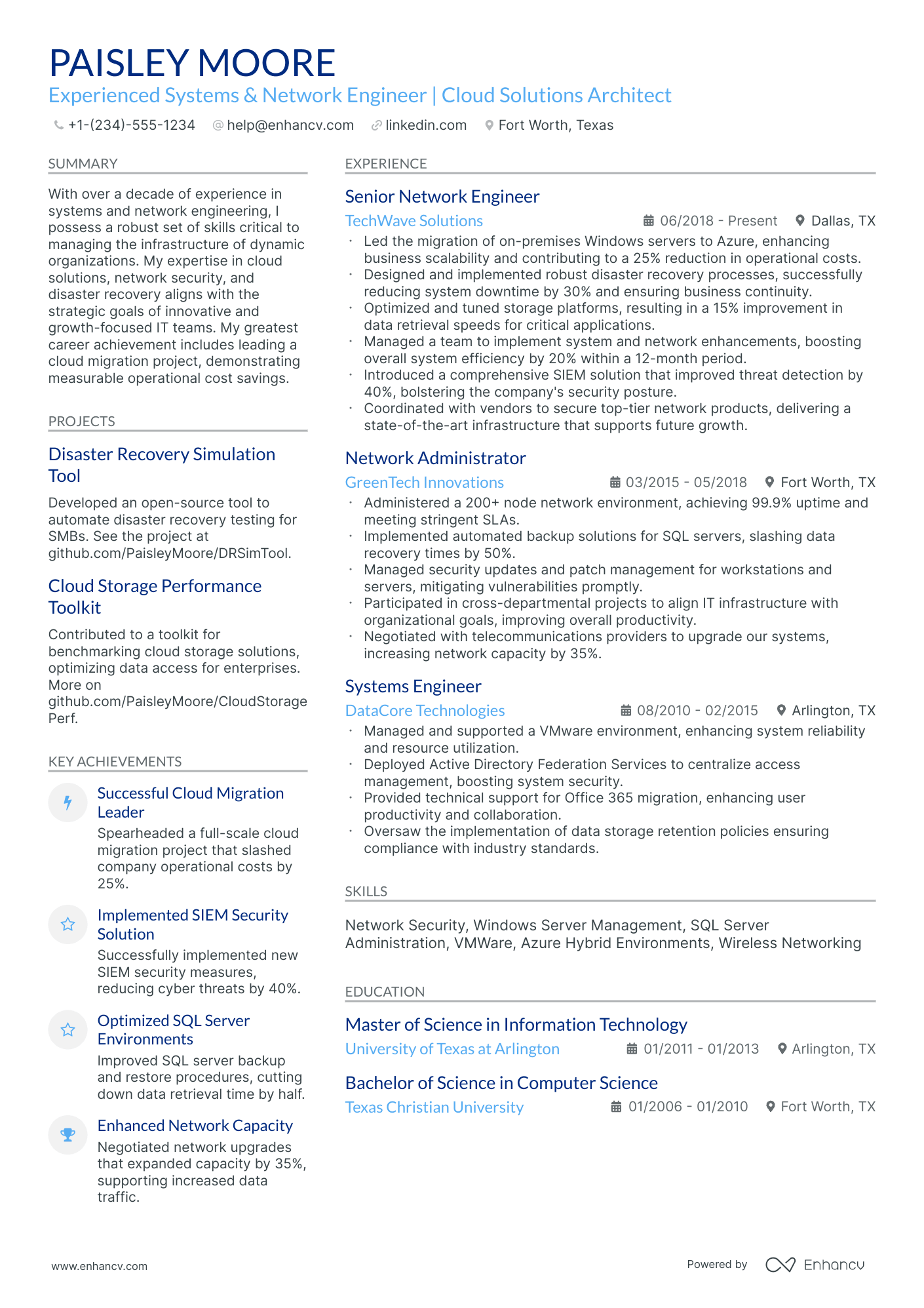As a system and network engineer, you might find it challenging to distill complex projects and technical skills into a concise and readable resume format. Our guide provides expert tips and examples to help you effectively communicate your expertise, ensuring your resume makes a strong impression on potential employers.
- System and network engineer resumes that are tailored to the role are more likely to catch recruiters' attention.
- Most sought-out system and network engineer skills that should make your resume.
- Styling the layout of your professional resume: take a page from system and network engineer resume examples.
How to write about your system and network engineer achievements in various resume sections (e.g. summary, experience, and education).
- QA Analyst Resume Example
- Computer Support Specialist Resume Example
- IT Infrastructure Project Manager Resume Example
- Service Desk Manager Resume Example
- Cnc Programmer Resume Example
- Statistical Programmer Resume Example
- Wireless Network Engineer Resume Example
- Splunk Developer Resume Example
- Cmm Programmer Resume Example
- IT Specialist Resume Example
The importance of format and layout in your system and network engineer resume
Consider you're an HR professional at company X, evaluating two system and network engineer candidate resumes. John Smith presents a simple, traditional, and easy-to-read resume. Edward Price, however, uses a non-conventional, often illegible format. Whose resume would you spend more time on to understand their experience? This scenario underscores the importance of your system and network engineer resume’s design. It should be simply formatted and clearly communicate why you are the ideal candidate for the role.
Achieve this balance by:
- Listing your experience, beginning with the most recent and relevant, in reverse chronological order;
- Ensuring your header contains essential information, such as contact details, a headline, and a portfolio link. Include a professional photo in the system and network engineer resume header if you have one;
- Including only the most important and relevant resume sections to showcase your expertise and stand out from other candidates;
- Editing your system and network engineer resume to be no longer than two pages if you have extensive relevant experience. Use your limited resume space judiciously.
Also, remember that your system and network engineer resume might initially be scanned by an Applicant Tracker System (ATS).
When it comes to ATS:
- Opt for simple and legible fonts like Raleway, Rubik, Lato, etc., making your experience easy for the ATS to scan;
- Use serif and sans-serif fonts, both of which are ATS-friendly;
- Avoid overused options like Arial and Times New Roman, which, while suitable, may lack personality.
Contrary to a common myth, our recent study shows that the ATS can effectively process both one-column and two-column resumes. Learn more about this in the ATS myths guide.
Finally, when submitting your system and network engineer resume, always export it as a PDF to ensure all information remains intact, making the document easier to print, read, and scan.
Consider your target market – resumes in Canada, for example, follow different layout conventions.
Upload & Check Your Resume
Drop your resume here or choose a file. PDF & DOCX only. Max 2MB file size.
PRO TIP
Showcase any ongoing or recent educational efforts to stay updated in your field.
The five (plus) definite sections your resume for a system and network engineer job should include are:
- Header with your headline, contact details, and/or a preview of your work
- Summary (or objective) to pinpoint how your success aligns with the role
- Experience with bullets of your most relevant achievements in the field
- Skills to integrate vital job requirements (both technical and personal)
- Your further dedication to the field, showcased via relevant higher education and/or certifications
What recruiters want to see on your resume:
- Professional certifications (e.g., Cisco CCNA/CCNP, CompTIA Network+, Juniper JNCIA-Junos)
- Solid understanding of network infrastructure and hardware
- Experience with network design and implementation
- Proficiency in network monitoring and security tools
- Demonstrated abilities in troubleshooting and resolving complex technical issues
Guide to your most impressive system and network engineer resume experience section
When it comes to your resume experience , stick to these simple, yet effective five steps:
- Show how your experience is relevant by including your responsibility, skill used, and outcome/-s;
- Use individual bullets to answer how your experience aligns with the job requirements;
- Think of a way to demonstrate the tangible results of your success with stats, numbers, and/or percentages ;
- Always tailor the experience section to the system and network engineer role you're applying for - this may sometimes include taking out irrelevant experience items;
- Highlight your best (and most relevant) achievements towards the top of each experience bullet.
You're not alone if you're struggling with curating your experience section. That's why we've prepared some professional, real-life system and network engineer resume samples to show how to best write your experience section (and more).
- Played a pivotal role in the migration of on-premises data centers to a hybrid cloud infrastructure for improved scalability and disaster recovery, resulting in a 40% increase in operational efficiency.
- Orchestrated the deployment of a secure WAN solution connecting multiple branches, which standardized company-wide communication protocols and bolstered network security.
- Enhanced system monitoring by implementing an advanced SIEM solution that reduced incident detection times by 30% and improved response effectiveness.
- Spearheaded the redesign of the company's network architecture to support a 300% increase in remote workstations while maintaining robust security standards.
- Managed a team of technicians in the rollout of a new VoIP phone system across the organization, which reduced telecommunication costs by 25% while enhancing feature availability.
- Developed and executed a comprehensive disaster recovery plan that minimized downtime during critical outages, ensuring business continuity.
- Optimized network performance by implementing traffic shaping and QoS policies, which led to a 20% improvement in bandwidth utilization across key business units.
- Successfully designed and deployed a multi-site VPN solution that facilitated secure and efficient data sharing between the headquarters and remote offices.
- Pioneered the integration of a new network monitoring platform that decreased the mean time to resolution for network outages by 50%.
- Automated routine network maintenance tasks using scripting, which boosted the IT department's productivity by freeing up over 20 hours of staff time per week.
- Implemented a comprehensive endpoint security strategy that protected against advanced persistent threats and decreased malware incidents by 35%.
- Designed and deployed a scalable wireless infrastructure across the corporate campus, supporting an increase in mobile device usage and fostering a more flexible work environment.
- Led the successful deployment and configuration of network hardware, including routers, switches, and firewalls, for a new office, facilitating on-time project completion within budget.
- Conducted thorough security audits that resulted in the hardening of network devices and the implementation of stringent access control policies.
- Collaborated cross-functionally to establish secure data flow patterns that aligned with compliance regulations like GDPR and HIPAA, significantly reducing the risk of data breaches.
- Championed the complete overhaul of the company’s WAN infrastructure, implementing SD-WAN technology which resulted in enhanced network agility and a 15% cost reduction.
- Conceived and deployed a centralized patch management system, ensuring 99.9% uptime and compliance with security standards across the server fleet.
- Piloted the adoption of IPv6 within the organization, future-proofing the network infrastructure and ensuring seamless interoperability with modern internet services.
- Engineered a comprehensive network traffic analysis system which identified and rectified bottlenecks, enhancing overall throughput by 25%.
- Directed the seamless merging of two corporate networks post-acquisition, ensuring zero downtime and maintaining productivity during the transition period.
- Fostered strong relationships with vendors to negotiate and secure state-of-the-art networking equipment at 20% below market rates, resulting in significant cost savings.
- Solely responsible for the design and implementation of a multi-tenant cloud infrastructure, which supported a 50% increase in client services capacity.
- Overhauled the company’s firewall and intrusion prevention systems to robustly defend against evolving cybersecurity threats.
- Initiated and led the transition to a new enterprise resource planning system, streamlining internal processes and improving data analytics capabilities.
Quantifying impact on your resume
- Highlight the number of network devices you have managed and maintained to demonstrate large-scale operational capabilities.
- Specify the percentage of network uptime you have achieved to show your commitment to reliability and stability.
- Detail the size of the infrastructure you have supported, including servers, storage, and networking equipment, to illustrate expertise in various environments.
- Mention the volume of data traffic you manage regularly to indicate your experience with high-demand networks.
- Include the number of security incidents prevented or resolved to emphasize your proactive approach to network security.
- List any budget figures you have managed or cost savings achieved through strategic system implementations to showcase your financial acumen.
- Enumerate the number of projects led or contributed to, underlining your project management and teamwork skills.
- Provide the number of users or endpoints you support to reflect your ability to handle user demand and network load.
Action verbs for your system and network engineer resume
What can candidates do about their resume, if they have no experience
Job requirements can sometimes be answered by other elements you could make more prominent in your system and network engineer resume.
Thus, you'd be substituting your lack of experience with your relevant:
- Education with details of skills you've obtained that align with the job
- Internships and short-term jobs that are once more dedicated to putting your expertise in the spotlight
- Skills section answering basic and - potentially - more specific job qualifications
- Strengths or accomplishments to show the unique value you present, even as a candidate with less or no professional experience in the industry.
Recommended reads:
PRO TIP
If you're in the process of obtaining your certificate or degree, list the expected date you're supposed to graduate or be certified.
The heart and soul of your system and network engineer resume: hard skills and soft skills
If you read between the lines of the system and network engineer role you're applying for, you'll discover that all requirements are linked with candidates' hard skills and soft skills.
What do those skills have to do with your application?
Hard or technical skills are the ones that hint at your aptitude with particular technologies. They are easy to quantify via your professional experience or various certifications.
Meanwhile, your soft skills are more difficult to assess as they are personality traits, you've gained thanks to working in different environments/teams/organizations.
Your system and network engineer resume skills section is the perfect opportunity to shine a light on both types of skills by:
- Dedicating a technical skills section to list up to six technologies you're apt at.
- Focusing a strengths section on your achievements, thanks to using particular people skills or technologies.
- Including a healthy balance of hard and soft skills in the skills section to answer key job requirements.
- Creating a language skills section with your proficiency level - to hint at an abundance of soft skills you've obtained, thanks to your dedication to learning a particular language.
Within the next section of this guide, stay tuned for some of the most trending hard skills and soft skills across the industry.
Top skills for your system and network engineer resume:
TCP/IP
DNS
DHCP
Linux System Administration
Windows Server Administration
Network Security
Firewall Configuration
Virtualization (VMware, Hyper-V)
Network Monitoring Tools (Nagios, Zabbix)
Cloud Computing (AWS, Azure)
Problem-Solving
Communication
Teamwork
Time Management
Attention to Detail
Adaptability
Critical Thinking
Project Management
Customer Service
Analytical Thinking
PRO TIP
If you happen to have plenty of certificates, select the ones that are most applicable and sought-after across the industry. Organize them by relevance to the role you're applying for.
Listing your education and certifications on your system and network engineer resume
Don't underestimate the importance of your resume education section . As it may hint at various skills (and experience) that are relevant to the job. When writing your education section:
- Include only higher education degrees with information about the institution and start/end dates
- If you're in the process of obtaining your degree, include your expected graduation date
- Consider leaving off degrees that aren't relevant to the job or industry
- Write a description of your education if it presents you with an opportunity to further showcase your achievements in a more research-focused environment
When describing your certifications on your resume, always consider their relevancy to the role. Use the same format to describe them as you would for your education. If you're wondering what the best certificates out there are for system and network engineer roles, check out the list below.
The top 5 certifications for your system and network engineer resume:
- Certified Information Systems Security Professional (CISSP) - (ISC)²
- Cisco Certified Network Associate (CCNA) - Cisco
- Cisco Certified Network Professional (CCNP) - Cisco
- CompTIA Network+ - CompTIA
- Microsoft Certified: Azure Administrator Associate - Microsoft
PRO TIP
The more trusted the organization you've attained your certificate (or degree) from, the more credible your skill set would be.
Recommended reads:
Should you write a resume summary or an objective?
No need to research social media or ask ChatGPT to find out if the summary or objective is right for your system and network engineer resume.
- Experienced candidates always tend to go for resume summaries. The summary is a three to five sentence long paragraph that narrates your career highlights and aligns your experience to the role. In it you can add your top skills and career achievements that are most impressive.
- Junior professionals or those making a career change, should write a resume objective. These shouldn't be longer than five sentences and should detail your career goals . Basically, how you see yourself growing in the current position and how would your experience or skill set could help out your potential employers.
Think of both the resume summary and objective as your opportunity to put your best foot forward - from the get go - answering job requirements with skills.
Use the below real-world system and network engineer professional statements as inspiration for writing your resume summary or objective.
Resume summaries for a system and network engineer job
- Seasoned system and network engineer with a robust 10-year track record of orchestrating the seamless operations of intricate enterprise-level networks, specializing in cloud infrastructure and cybersecurity. Adept in deploying robust solutions that elevated system efficiency by 40%. Eager to leverage extensive technical acumen to ensure maximum network uptime and resilience.
- Dedicated IT professional with over 8 years of experience in software development looking to transition into systems and network engineering. Armed with a profound knowledge of coding, troubleshooting and a recent Cisco Certified Network Associate (CCNA) certification. Proven ability to manage complex projects and eager to apply a strong analytical mindset to network optimization tasks.
- Driven professional with a background in customer support and a passion for technology, endeavoring to dive into the world of system and network engineering. Bringing forth strong problem-solving skills, a Bachelor's degree in Computer Science, and a voracious appetite for learning about the latest networking trends and practices.
- Experienced Project Manager with 6 years in the construction industry making a strategic career pivot into system and network engineering. Brings to the table an extraordinary capacity for team leadership and complex logistical coordination, reinforced by a recent certification in network security and a personal home-lab setup where practical networking skills have been honed.
- Master’s degree holder in Information Technology seeking an entry-level opportunity in system and network engineering. Keen to apply theoretical knowledge, hands-on internship experience, and an ambitious objective to develop into a profound expert in network architecture and infrastructure management.
- Mechanical Engineer with 5 years’ experience in product design transitioning to system and network engineering, with recent training in network administration and security protocols through an intensive bootcamp. Aiming to leverage analytical prowess and attention to detail to optimize network performance and reliability.
Optimize your resume summary and objective for ATS
Drop your resume here or choose a file.
PDF & DOCX only. Max 2MB file size.
Miscellaneous system and network engineer resume sections for a more personalized approach
Your system and network engineer resume can reflect even more upon your personality and best qualities - that is if you decide on including a couple of additional resume sections to support your application.
Some of the best-accepted industry-wide choices include the:
- Resume projects - getting into the outcomes of your most important work, so far;
- Languages on your resume - detailing your proficiency level;
- Special recognitions - dedicated to your most prominent industry awards;
- Hobbies and interests - defining how you spend your free time.
Key takeaways
We've reached the end of our system and network engineer resume guide and hope this information has been useful. As a summary of our key points:
- Always assess the job advert for relevant requirements and integrate those buzzwords across various sections of your system and network engineer resume by presenting tangible metrics of success;
- Quantify your hard skills in your certificates and skills section, while your soft skills in your resume achievements section;
- Ensure you've added additional relevant experience items, such as extracurricular activities and projects you've participated in or led;
- Use both your resume experience and summary to focus on what matters the most to the role: including your technical, character, and cultural fit for the company.
